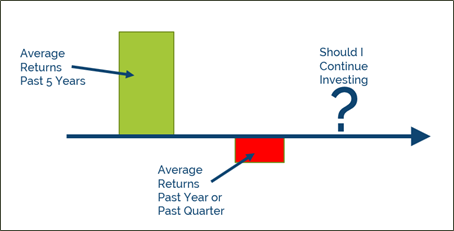If I were to ask you to name 10 restaurants, chances are you would name 10 restaurants you’ve eaten at recently. You likely wouldn’t name restaurants you’ve eaten at say 1-2 years ago that you no longer patronize. When it comes to the business world, managers tend to give more importance to the past 3 months of work done by their employees rather than their performance over the past year. Why is this and how does it impact wealth management and financial planning?
What Is Recency Bias?
Recency bias is our tendency as humans to give more weight to recent events than we should and project those events into our future. It is a very common psychological tendency in humans. In fact, the BeFi Barometer 2021 study, conducted by Cerulli Associates and sponsored by Schwab Asset Management in collaboration with the Investments & Wealth Institute, found that recency bias is the most common behavior bias that advisors believe is affecting clients’ investment decisions. It ranks as the number-one bias for every generation—and is one place Millennials and the Silent Generation find common ground.

Recency Bias in Investing
Recency bias is very common in investing; investors tend to give more importance to short term performance compared to long term performance. For example, an investor invests $100,000 in a mutual fund. Over 5 years the market value of his investment grows to $175,000. Then in the last three months, the value falls to $150,000. The investor may look at his investment performance of as a loss of $25,000 in 3 months and not an overall profit of $50,000 in 5 years. This is recency bias.
Investors often stay away from asset classes when markets have fallen sharply when on the contrary, they should consider rebalancing and investing back into the asset class because they may be buying further at attractive prices. Recency bias clouds our judgment and is detrimental to our financial interests in the long term. We should recognize our tendency to have recency bias and look for ways to mitigate it.
Recency Bias with Inflation
According to the Associated Press, U.S. inflation recently hit a new 40-year high, jumping 7.9 percent over past year. As we see our gas pumps increase higher than we can remember and our grocery and restaurant bills skyrocket, it is easy to think that inflation is here to stay. It’s hard for us to think down the road a couple of years and envision inflation coming down from recent highs. The difficulty once again stems from our recency bias.
Why Fight Recency Bias
There are several steps you can take to fight off your own tendency to reflect on recent adverse events and not overweight them in your future. If you are a long-term investor, you need to get comfortable with the concept that you can and will lose money in certain market environments.
If you are nearing retirement, you may want to consider taking less risk with your overall asset allocation. It doesn’t mean you should panic sell stocks when they are down. Unless you already have sufficient money for all you will need in retirement, you’ll likely need to generate some growth in the coming years. That can’t be achieved by going all to cash.
Your goals, the money you need for your goals, and your time horizon are what matters. At Intelligent Investing, we use Intelligrations™ that integrate our clients’ financial goals with their risk tolerance and portfolio in real time.
How to Fight Recency Bias
Here are a few suggestions on ways to fight recency bias:
- Get an accurate picture of your financial goals, your balance sheet, and your income statement. This will help you stay calm when things seem out of hand.
- Set accurate expectations and assumptions when building your financial plan. Don’t just use recent events and market conditions.
- Stress test your portfolio using different potential environments your portfolio may go through.
- Consider professional help and accountability from a fiduciary advisor. You need to find a professional who is always in your corner and is legally obligated to always act in your best interest.
Keeping recency bias out of your thoughts and portfolio can be very difficult–but not impossible. With the right tools and right financial accountability partner, you can fight your own thoughts that try to sabotage your hard-earned nest egg.
If you’d like to become a client of Intelligent Investing, please click here to call or schedule a “discovery” meeting.




